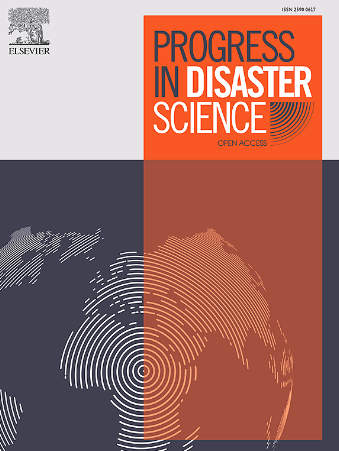Community insights on tourism development and nature-based solutions for increased resilience to coastal hazards at Caota sand dunes Geopark in Taiwan
IF 3.8
Q3 ENVIRONMENTAL SCIENCES
引用次数: 0
Abstract
Geoparks have the ability to function as complex social-ecological systems, where the interactions between natural landscapes and local communities shape climate change adaptation and mitigation outcomes. This study evaluates how community-driven tourism initiatives at Caota Geopark, Taiwan, contribute to climate resilience by enabling public education and engagement with nature conservation. Using a social-ecological systems lens, this study explores how the interplay between community participation and coastal ecosystem processes supports Nature-based Solutions (NbS) in addressing locally identified climate risks. This is achieved through a combination of contextual analysis and qualitative methods, including focus group discussions and semi-structured interviews with local stakeholders. Thematic analysis revealed that environmental education and awareness-building have strengthened local commitment to environmental stewardship. Moreover, enhancing the buffering capacity of the coastal dunes and maintaining associated ecosystem services were identified as key strategies for mitigating local hazards. However, ongoing challenges such as waste accumulation, inadequate infrastructure, and human disturbances, undermine ecosystem functions and visitor experiences, revealing critical vulnerabilities within the social-ecological system. Additionally, the study found a gap in inclusive, bottom-up governance structures that could help integrate community needs into geopark planning. Building on these insights, the study proposes a framework for sustainable tourism management and locally grounded climate adaptation strategies that stimulate active community participation. It also offers policy recommendations to support more integrated, adaptive, and community-responsive geopark governance.
台湾曹塔沙丘地质公园旅游业发展的社区见解和基于自然的解决方案,以提高对海岸灾害的抵御能力
地质公园有能力作为复杂的社会生态系统发挥作用,其中自然景观与当地社区之间的相互作用决定了适应和减缓气候变化的结果。本研究评估了台湾高塔地质公园社区驱动的旅游项目如何通过促进公众教育和参与自然保护来促进气候适应能力。本研究利用社会生态系统的视角,探讨了社区参与与沿海生态系统过程之间的相互作用如何支持基于自然的解决方案(NbS)解决当地确定的气候风险。这是通过上下文分析和定性方法的结合来实现的,包括焦点小组讨论和与当地利益相关者的半结构化访谈。专题分析显示,环境教育和提高认识加强了当地对环境管理的承诺。此外,提高海岸沙丘的缓冲能力和维持相关的生态系统服务是减轻地方灾害的关键策略。然而,诸如垃圾堆积、基础设施不足和人为干扰等持续存在的挑战破坏了生态系统功能和游客体验,暴露了社会生态系统中的关键脆弱性。此外,该研究还发现,在包容性、自下而上的治理结构方面存在差距,这些结构有助于将社区需求纳入地质公园规划。在这些见解的基础上,该研究提出了可持续旅游管理框架和基于当地的气候适应战略,以促进社区积极参与。它还提供了政策建议,以支持更综合、适应性和社区响应的地质公园治理。
本文章由计算机程序翻译,如有差异,请以英文原文为准。
求助全文
约1分钟内获得全文
求助全文
来源期刊

Progress in Disaster Science
Social Sciences-Safety Research
CiteScore
14.60
自引率
3.20%
发文量
51
审稿时长
12 weeks
期刊介绍:
Progress in Disaster Science is a Gold Open Access journal focusing on integrating research and policy in disaster research, and publishes original research papers and invited viewpoint articles on disaster risk reduction; response; emergency management and recovery.
A key part of the Journal's Publication output will see key experts invited to assess and comment on the current trends in disaster research, as well as highlight key papers.
 求助内容:
求助内容: 应助结果提醒方式:
应助结果提醒方式:


